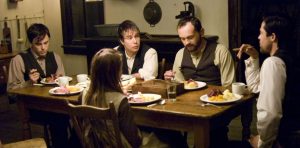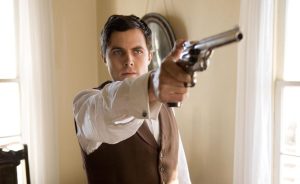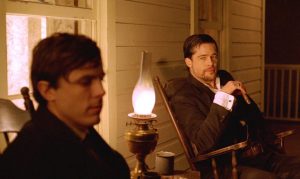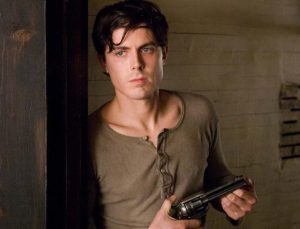Andrew Dominik’s The Assassination of Jesse James by the Coward Robert Ford is a work of the most supreme audacity. A Western with little action, a history lesson without any heroes, and a character study that uses contemplative silence rather than the roar of gunfire, the film is everything I had hoped it to be and more; one of the few movies all year that actually got better as it went along, reducing its 160-minute running time to a mere flash of brilliance.
Who could imagine that in 2007, a time when Hollywood is in such an advanced state of decay that every move seems pre-approved by focus groups and teams of cautious lawyers, we would be honored with such risk and bold artistry? After all, here’s a film concerning one of the most famous figures in history, an outlaw known by young and old alike, and rather than pander to the obvious with a romp of hard riding and gunplay, that very man is reduced to a supporting character; a symbol, yes, but not at all the driving narrative force. Thankfully, blissfully, this is not a tale of bank heists and train robberies, showdowns at high noon, or cat and mouse dramatics that reduce the untamed frontier to clever criminals and no-nonsense lawmen. Instead, this is a film about nothing less grandiose than America itself — its myths, its illusions, its raw, wounded identity — with the necessary sense of wonder to pull it off.
Such ambitions are fraught with peril, of course (resentful glances and accusations of unjust pretension, to name a few), but each and every frame is a testament to the overall success, and by the final act — a coda concerning the days and nights of Robert Ford after the infamous assassination that stands as some of the finest filmmaking I’ve ever seen — we are not exhausted, or burdened, or bereft, but thankful at having lived to see it all. The year has seen its masterpiece.

You’ll hear the proceedings described as languid, dry, and protracted, but rather than piercing the film’s armor, such classifications work in its favor. It is all of those things, of course, and thank fuck for that, for how else to stake an overdue claim for the Wests very soul? For too long, we’ve lived and died by the West According to Ford (John, not Bob): When the legend becomes fact, print the legend. That legend appealed to our hearts, our very emotional cores, and by dispensing with unpleasant facts, contradictions, and complexities, it re-fought old battles, settled old scores, and helped re-fashion the eternal lie of American exceptionalism.
The men of the West, then, those outsized warriors who lived by their own rules and thereby held out that same possibility for lesser mortals, were what we imagined ourselves to be, even if we claimed to be shocked and appalled by their less than savory methods. For though we admire murderous bandits and wait with bated breath for their tales to be told, we must do so with respectability and caution, lest we become what we worship. It never ceases to amaze how reluctant we are to admit our instinctive bloodlust; our deference to instruments of death as a means to achieve true immortality.
This regeneration through violence, then, is not some abstract academic theory, but our daily bread; our lone avenue to the depths of our otherwise untouchable civilization. But again, we are only able to enjoy these comforts through the denial of their essence. And so, Jesse James becomes the last, defiant gasp of the Confederacy, or Billy the Kid a rugged populist champion battling corporate power, rather than a pair of murdering bastards who did it all for the allure of the coin. Our heroes could never be so base and selfish, we cry.

Dominik’s film, though, is not a demystifying account of James’ career as a thief and killer, as interesting as that could have been. Instead, the whole, big, wonderful thing is an elegy to that sad, final year, a time in which James still held popular appeal, but was clearly finished on the world stage. He had been doing his gig for so long that by the time the story begins, when James is well past thirty (unheard of for an outlaw), he is not the face of a wide-eyed renegade, but a gloomy, perhaps suicidal footnote. The opening train robbery, while masterfully staged (and evocative of James’ callousness), is a last hurrah of sorts, and never again will “the gang” enjoy the thrill of the chase. From this point on until James’ death in April of 1882, he will be a man without purpose; a depressed figure of little import save the fumes on which to derive a small slice of personal satisfaction. James (ably played by Brad Pitt), though having a family (but no real sense of home), spends most of his time on frozen ground, muddy streets, and in paranoid seclusion.
He’s a wanted man, but not so much wanted as holding ground as a pesky irritant for a nation on the threshold of leaving the West behind. By the standards of the time, James is at risk of becoming an old man, and by not dying — and soon — he will suffer the ignoble fate of outliving his own legend. And so, we have Bob Ford (Casey Affleck), a deluded, naive young man with only a budding self-importance to hold up his trousers. It will be his job to ensure that James dies so as to live forever, and by virtue of this act, himself experience a fleeting fame that will court its own sense of infamy and eventually, violent death. Ford’s primary desire — to kill, and thereby appropriate, Jesse’s very fame (similarly to Mark David Chapman’s murder of John Lennon) — is the one shot he’s been granted; the means of his all-American success story.
Before the deed is done, Ford spends that final year with and near Jesse James, absorbing his daily routines in the style of your average sycophant, but also planning jobs that will never come. It’s the unspoken truth among the entire outfit (scattered remnants of the old crew, including Robert’s brother Charley, most of whom are by this time dead or in jail) that they are, by necessity, reduced to laying low and avoiding the law rather than acting as proud desperados in search of treasure. In some respects, Ford is James’ final witness; the lone holdout who still believes the pulp novels and newspaper accounts because he’s based too much of his young life on the man already. To turn back now, to face the lies and half-truths peddled about anyone on society’s fringes would be the ultimate act of self-annihilation; a form of betrayal that may as well be suicide.

And therein lies one of many insightful turns that belies the genre’s usual cheap moralizing: though the “official” story has Ford becoming an inside man to stop this bandit’s murderous reign (and save his own skin), it is an unstated revenge that pulls that final trigger. James must die because he has not lived up to the promise; the man is flesh and blood, yes, and quite small at that. He doesn’t move through the shadows, lighting up rooms and causing the female persuasion to swoon in ecstasy; he is but a moody, unhappy creep, and any allure he may have had in the past has now given way to utter banality. How could such a man be admired so, to the point that his very name generates a buzz of excitement? James is but a fiction, a fading star who would now blend into any crowd and just as likely, seeks to do exactly that. Is that what he’s become? And does such a man play with his kids, kiss his wife, and speak of quieter days? James is not so much a fraud as a disappointment, and Americans have but one end for those who dare challenge their patience.
The beauty of the piece is that it stays with Ford as the lightning rod of our collective interest, and he even manages to stand above and beyond James himself. This is not a biography of James, nor is it even a study of his tics and peccadilloes, but rather the deconstruction of an image as seen by an outsider; a typical American youth who idealizes him all out of proportion and is so unforgiving that he’s moved to kill that which he worshipped for the slightest turn. Fortunately, Affleck is up to the task, and it’s a performance perfectly suited for the film: nervous, arrogant, and suggestively creepy, he’s the kid who won’t let go, with the baby face to mask a secret longing. We must believe that James would let this nobody into his inner circle, and we do, mainly because James is self-aware enough to know that at this stage, hero worship doesn’t come as readily as it used to.
But there’s also that sense of destiny about the boy, as if James knows Ford will betray him, though the time and manner are yet unknown. James retains the usual suspicions that have kept him alive this long (such as always having a loaded gun at the ready, even while asleep), but they are mere habits from the past, and for a man of his station, the instincts are the last to go. He’ll get sloppy, whether by accident or design, and when he does, he fully expects the boy to take advantage. There’s no historical evidence to suggest that James let Ford kill him that fateful day, but by all accounts, there’s nothing else to explain why James, for what appears to be the first time, let his guard down so glaringly. In some perverse way, James is granting Ford’s wish, but with a slight smirk on the side: yes, you’ll secure your own fame for killing such a man, but unintended consequences surely await.

Ford had every reason to believe that he would be lionized for years on end for his deed, parlaying the murder into traveling shows, books, and perhaps a political career. For a time, Ford performed on stage, reenacting the killing again and again for packed houses. It was a living, though not yet the big time, and it kept Ford’s name in the lights beyond reasonable expectations. And yet, Americans, fickle to their marrow, turned on poor Ford, slapping on him the worst possible label for anyone seeking higher glory: he was, at bottom, a coward. Not only did Ford shoot James in the back, but he felt compelled to shoot him at all, a truly heinous act when one considers the two men as societal creations. And here began the revisionism, which itself built upon the myth that had not yet faded during James’ life: the charisma, the charm, the devilish rake that never failed to keep us on the edge of our seats. Killings? Cruelty? Perhaps, but in the face of such daring, what could it possibly matter?
And compared to this half-baked Ford fella, James all but deserved our applause. Hell, we’ll even fudge the numbers a bit so that James barely killed anybody at all. And wasn’t his true cause the dear old South? Truth faded into fiction, and back again, and Ford was the dull, trite present. He was a clear opportunist, and his crass exploitation of an actual legend seemed more than unsavory, it reeked of treason. Small, frail men don’t dash away our kings. We’re a proud, muscular nation, cocked and loaded at all times, and the powerful remain such, lest we encourage the weak. The assassination of Jesse James shocked us with this maxim’s opposite, and before we got too far, we’d have to redefine what the hell it all meant.

As said, the depressing end to Ford’s life, captured in a final act of utter perfection, was the necessary corrective to any presumption that this was a ride through James’s life and times. It is an almost impossibly delicious turn that Ford himself was killed by a publicity hound; blasted by a shotgun in his Colorado saloon in June of 1892, though by that time he was a lonely, despised pariah. As the narration reminds us, there would be no novels about this man, no national tours of his corpse, and no post-mortem photographs to be sold in shops and apothecaries. James had all of that and more, and Ford was simply tossed in the ground and forgotten.
What he had hoped for never came to pass, and even to this day, the importance (or lack thereof) of each is firmly in place. And as such, the flame of celebrity we all seek ends in shrug-filled anonymity, the very lot that defines us so readily, almost as if it were invented for us exclusively. It’s the American dilemma, then: so desirous of privacy and independence, yet utterly reliant on the public gaze to define us in full. Ford was both a man ahead of his time and of it, and surely, he has a place in the pantheon of our most “typical” personages. And what a magical manner by which to tell his tale, now of a time long past, but so essential in the continuing saga of our national life. Neither epic nor itself romantic, despite the length and star power, the film is instead an unmistakable dirge; powerful, involving, and breathtaking in turn, and just about the final word on fame, hero worship, and the American dream. And it arrived just in time.

Leave a Reply